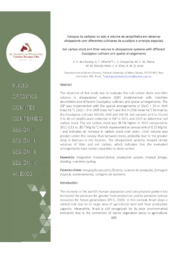Soil carbon stock and litter volume in silvopastoral systems with different Eucalyptus cultivars and spatial arrangements.
Soil carbon stock and litter volume in silvopastoral systems with different Eucalyptus cultivars and spatial arrangements.
Author(s): SANTOS, C. A. dos; OLIVEIRA, A. F. de; GONÇALVES, L. C.; VIANA, M. C. M.; GONTIJO NETO, M. M.; SILVA, E. A.; LANA, A. M. Q.
Summary: The objective of this study was to evaluate the soil carbon stock and litter volume in silvopastoral systems (SSP) implemented with Urochloa decumbens and different Eucalyptus cultivars and spatial arrangements. The SSP was implemented with the spatial arrangements of (3x2) + 20 m (434 trees ha-1), (2x2) + 9 m (909 trees ha-1) and 9x2 m (556 trees ha-1) formed by the Eucalyptus cultivars GG100, I144 and VM 58. Soil samples at 0 to 20 and 0 to 40 cm depths were collected in SSP in 2011 and 2015 to determine soil carbon stock. The soil carbon stock was 38.5% higher in 2015 compared to2011 (111 vs. 80.7 Mg ha-1), which represented an annual sink of 6.22 Mg ha1 and indicates an increase in carbon stock over years. Litter volume was greater under the canopy than between trees, probably due to the greater drop in biomass in this location. The silvopastoral systems showed similar volumes of litter and soil carbon, which indicates that the evaluated arrangements have similar capacities to store carbon.
Publication year: 2023
Types of publication: Paper in annals and proceedings
Unit: Embrapa Maize & Sorghum
Observation
Some of Embrapa's publications are published as ePub files. To read them, use or download one of the following free software options to your computer or mobile device. Android: Google Play Books; IOS: iBooks; Windows and Linux: Calibre.
Access other publications
Access the Agricultural Research Database (BDPA) to consult Embrapa's full library collection and records.
Visit Embrapa Bookstore to purchase books and other publications sold by Embrapa.

